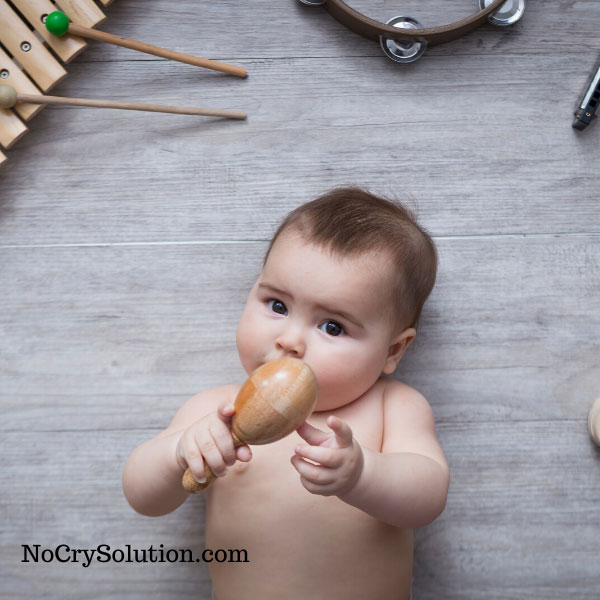
Music is wonderful for babies’ development! If you can’t carry a tune, don’t fret! There are lots of ways to bring music into your baby's life.
Not only do babies love it, but it’s also great for their developing brains. According to a study at the University of Georgia, “Children who grow up listening to music develop strong music-related connections in the brain. Some of these music pathways actually affect the way we think. Listening to classical music seems to improve our spatial reasoning...” (source)
Furthermore, it’s calming, it facilitates language development, and most of all, it’s enjoyable for both parents and children. The more music your baby hears and the more "musical" connections her brain makes, the more music will play a role in her later life.
Music and your baby
Studies have shown that even within the womb, a baby responds to music. Here are some ideas for how to introduce your baby music:
- When your baby is upset, hold her close to you, sing to her, and dance and sway with the music. The combination of close body contact, movement, and music can do wonders to soothe a crying baby.
- Experiment with various types of music to see how your baby reacts. When she is upset or sleepy, she may respond to lullabies. When she is cheerful, she may love to dance to your favorite pop song with you. When she is quiet and alert, she may like to listen to classical music, country or jazz.
- Use music to let your baby know what is happening and to establish comforting routines:
- Put on the same calming music every time you prepare to give your baby a massage;
- Sing the same lullaby every night as you put your baby to bed;
- Play fun music in the car and sing along so that your baby learns it is fun to go places in the car;
- When you are about to change her diaper, turn on a musical mobile near the changing table;
- Put on some soft music during your baby's bath;
- If baby responds well to it, play your favorite songs during the "fussy hour" in the evening to cheer both you and baby.
Music and the older baby
As your baby grows, you will delight in seeing how she begins to rock, wiggle, bob, and dance to the music she hears. Here are some ways in which you can nurture your older baby's relationship with music.
- Continue to dance and sing with your baby. Create your own lyrics to a favorite song, with your baby's name in it ("You are my Thomas, my little Thomas, you make me happy when skies are gray" to the tune of "You Are My Sunshine"). Soon your baby will be singing right along with you.
- Let your baby play with musical instruments. You can make them yourself: a drum made out of an empty coffee can; a pie pan and a spoon to tap out the rhythm to a song. And of course, you can also buy xylophones, tambourines, harmonicas and other instruments for your baby. Be prepared, however---babies can make a LOT of noise with these instruments.
- Find a "music and movement" playgroup for your baby, in which both you and your baby can learn about music and have fun with other babies and parents. Some cities also have musical concerts for young children.
Want more tips like this? Visit https://www.nocrysolution.com/.
This article is copyrighted by Elizabeth Pantley, author of The No-Cry Sleep Solution. (McGraw-Hill, 2020)



























